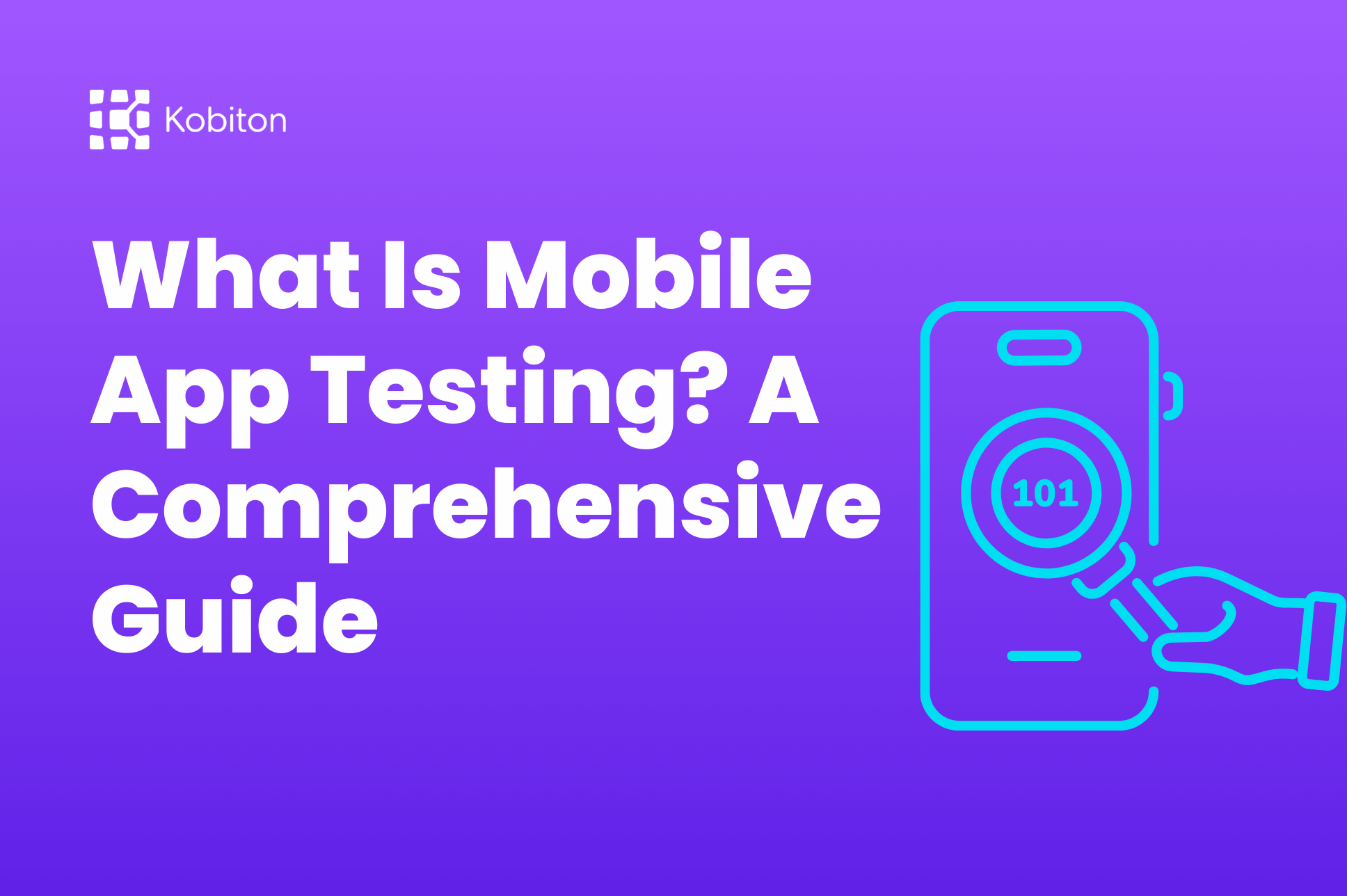
What Is Mobile App Testing? A Comprehensive Guide

Cara Suarez
Android app development is booming! And, a key component of app development is app testing. A robust mobile testing strategy is a critical part of the mobile app development process, playing a pivotal role in ensuring the quality, reliability, and performance issues of applications.
Interested in learning more about how to test Android apps on different devices (like a Samsung smart phone)? You’ve come to the right place. We’ll cover that here, and a whole lot more.
Automated tools for the Android app testing framework exist to provide fast, repeatable, and actionable feedback earlier in the development process. Kobiton offers tools that provide fast, continuous testing, which reduces development time, improves experience, and increases revenue impact in the market. Fortunately, best practices are simple to understand.
First, it’s important to understand the concepts of both iOS and Android app testing; an experienced developer is aware of Android trends and changes to the Android ecosystem, whether that’s conducting work from the command line, or elsewhere in the software.
Properly testing a mobile app, particularly for the Android platform, includes several steps and approaches. Each type is crucial to ensure that the app is stable, behaves predictably, is consistent, and is secure. You may have heard of Android app penetration testing — but there are a lot more than that.
Unit testing involves examining the individual components – or units – of an app’s source code in isolation, such as functions, methods, or modules, to ensure that they perform as intended. By isolating and scrutinizing these smaller units of code, developers can identify and rectify bugs at an early stage of development.
In mobile development, an application comprises various components or units that work together harmoniously to deliver the desired functionality. These units include user interfaces (UI), backend services, databases, and external APIs. Integration testing is crucial because it focuses on verifying that these units interact correctly when combined within the app.
Ensuring a seamless UI and user experience (UX) is of paramount significance in mobile app development because it directly influences satisfaction, engagement, and the app’s success in the market; this plays a critical role in preventing these pitfalls. By addressing these Android app testing best practices, you can begin improving the app experience with mobile testing.
Performance testing – which includes load testing, stress testing, and network performance testing – is essential to proactively identify and address these problems. It helps to optimize resource usage, handle demands, and ensure the app performs well under varying conditions.
Ensuring security and safeguarding data on mobile equipment is paramount. Common vulnerabilities, such as insecure data storage and weak authentication, can lead to data breaches and unauthorized access. Security testing helps identify and address these vulnerabilities.
Ensuring apps work seamlessly on different equipment is crucial due to the ecosystem’s diversity. Challenges arise from varying hardware and screen sizes. Compatibility test apps address these by checking behavior across a range of devices and OS versions.
Maintaining visual consistency across devices is crucial for a seamless experience. Design guidelines and style guides set visual standards, while automated processes like Applitools compare screenshots to detect discrepancies. Learn more about visual testing here.
A smooth app installation process is crucial for retention. Common installation issues include long downloads, failures, and confusion. Load testing, compatibility testing, and usability testing can prevent these problems.
Ensuring apps work well across different network conditions is essential. Challenges include handling offline scenarios and network transitions. In offline situations, apps should provide informative feedback and sync data correctly when back online.
Android Studio is often helpful, as it’s an official integrated development environment that’s able to be downloaded on any operating system. Android Studio is one of many tools used by professionals for assessment during the testing process — but besides Android Studio, what other tools and platforms are available?
Kobiton is a versatile mobile testing platform with many unique features and advantages. At its core, Kobiton boasts an extensive device cloud that encompasses a wide spectrum of products from various manufacturers, screen sizes, and operating systems.
A simple interface and robust automation capabilities set Kobiton apart. This intuitive platform is designed to cater to both seasoned testers and those new to mobile testing. With automation strategies, it’s possible to effortlessly create and execute test scripts across multiple products simultaneously, significantly expediting the process while maintaining consistency and reliability.
Espresso is Android’s native UI framework, purpose-built for automating UI and functional tests within applications. Developed by Google, Espresso testing boasts tight integration with the Android OS and the app being tested, resulting in highly realistic and dependable test scenarios.
Appium is a robust and open-source tool renowned for its capabilities in automating mobile applications. Developed as a cross-platform solution, Appium offers the flexibility to automate mobile apps on various operating systems, including Android and iOS, making it a versatile choice for mobile testing. Ultimately, setting up Appium and the cross-platform capabilities make it a valuable tool for organizations with diverse mobile development needs.
JUnit is a widely-used framework that plays a vital role in conducting unit testing for Android applications. In the context of development, JUnit enables developers to write and execute unit tests for specific components or units of their apps, such as individual methods or functions. Check out our guide to JUnit testing for mobile apps here.
By creating a mobile testing strategy that is part of the development plan, developers can create more reliable, more stable apps more quickly while spending fewer development resources. Your strategy should be the same — create your strategy early. Is an emulator function going to be beneficial? It helps to create (and answer) questions like that before you begin.
Identifying an app’s key functionalities is paramount in developing a focused and effective test apps strategy. To prioritize features, start by assessing their significance in fulfilling the app’s core purpose and experience.
It is essential to align methods with app requirements, taking into account factors such as the app’s complexity, target audience, and release timeline. The right combination of different methods can make all the difference.
A diverse marketplace of products presents significant challenges, and it’s crucial to prioritize compatibility on a representative sample of different equipment types, covering various screen sizes, OS versions, and manufacturers.
Integrating automation and continuous testing into the development workflow is a pivotal step that brings numerous benefits. It enables developers to automate repetitive tests, ensuring consistent and thorough coverage of critical functionalities while significantly reducing time.
Gathering feedback as part of testing provides real-world insights that can identify hidden issues. To incorporate this feedback effectively, developers should provide accessible channels to report problems or suggest improvements, such as in-app forms or online forums.
Kobiton can streamline the process by providing access to an extensive device cloud, ensuring comprehensive device coverage for compatibility. Its user-friendly interface and automation capabilities make it a valuable tool, reducing time and enhancing efficiency.
Begin by creating a Kobiton account and configuring your device settings. Organize your test cases and prioritize devices based on your target audience. Consider integrating Kobiton with your preferred framework and leverage its reporting and analytics features.
First, ensure that your app is built with debuggable settings enabled in the AndroidManifest.xml file. Next, set up and configure any necessary frameworks, such as Appium or Espresso, and make sure your test scripts are compatible with Kobiton’s platform.
Executing tests on real devices using Kobiton provides several advantages, including ensuring the accuracy of testing in a real-world environment, addressing device fragmentation, and verifying the app’s compatibility on a number of different products. To run tests on Kobiton, select the desired devices and OS versions from the device cloud and upload your test scripts created with your preferred framework, such as Appium or Espresso.
When reviewing results, focus on identifying patterns in failed tests, examining error messages, and studying screenshots and logs provided by Kobiton. These details can pinpoint specific issues within your app. Pay close attention to tests that fail consistently across different products, as they often indicate critical problems.
Integrating Kobiton into your CI/CD pipelines offers substantial advantages by automating testing, ensuring consistent test environments, and identifying issues early in the development cycle. To achieve this integration, select a compatible CI/CD tool, configure Kobiton commands within your CI/CD scripts, and set up automated test scripts tailored for Kobiton.
Embracing best practices is essential to streamline the testing process, identify and address issues proactively, and ensure a seamless experience. These tips for mobile app testing explore key best practices that encompass various aspects of testing, from prioritizing test cases and addressing device fragmentation to implementing automation and continuous methodologies.
Parallel testing is an approach that significantly reduces time, ensuring quicker feedback and faster development cycles. To implement parallel testing effectively, invest in a robust framework that supports parallel execution, design test cases that are independent and can run concurrently without interference, and leverage cloud-based platforms like Kobiton to access a wide array of products.
Understanding device usage patterns and analytics helps to gain insights into which devices, operating systems, and screen sizes are most commonly used by their target audience. By analyzing this data, teams can prioritize efforts on the most relevant configurations, ensuring compatibility and optimal experiences on the products that matter most.
Beta testing allows real-world feedback to be gathered before a public release. To conduct successful beta tests, start by recruiting a diverse group of beta testers representing your app’s target audience. Provide clear guidelines and instructions for testers, emphasizing the importance of detailed feedback on usability, functionality, and any encountered issues.
Manual testing excels in exploring new features; but, it can be time-consuming, is subject to human error, and it’s challenging to replicate across a wide range of products and scenarios. Learn more about manual testing here.
Automated testing is efficient, repeatable, and ideal for regression testing and verifying known scenarios. The optimal approach often combines both methods: Use manual testing for exploratory and usability aspects early in development and a mobile test automation tool for repetitive and regression testing in later stages.
Testing apps for different products can be challenging due to variations in screen sizes, resolutions, and operating system versions. However, Kobiton simplifies this process by offering real device testing within its platform. It provides access to an extensive device cloud, enabling developers to test their apps on a wide range of products, including the latest models and OS versions.
Sometimes there are even signs or traces of testing software on your device. For example, let’s see what a CQATest app on Android devices might be: first, it helps monitor software performance, and it’s one of many tools used (especially on Motorola devices).
How to make sense of it all? You’ve taken a great first step; allow Kobiton to help you make the next ones.
With this new understanding of how to test apps on different products – along with other strategies – you’ll be able to release better products and ultimately realize a greater market share. Getting started with Kobiton Mobile Testing is a straightforward process for newcomers. Begin by creating a Kobiton account on the website. Once registered, log in to your account, where you’ll find an intuitive interface that simplifies the testing process. To begin, upload your APK file to the platform.
Kobiton offers a wealth of resources, tutorials, and support options to help newcomers navigate the platform effectively. Beginners can explore the comprehensive documentation and video tutorials available on the Kobiton website, offering step-by-step guidance on using various features and functionalities.
Click here to request a Kobiton demo.